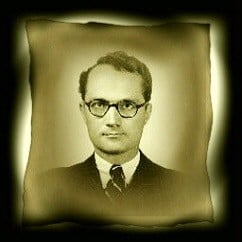
The son of a New Jersey stockbroker, Varian Fry had personally witnessed Nazi savagery on a trip to Germany. As a foreign correspondent for an American journal, The Living Age, in Berlin he had witnessed the first Nazi pogrom in 1935 and SA men brutalizing the Jews. Later, as an active member of a group called The American Friends of German Freedom, he had raised funds to support European anti-Nazis.
Now he and his friends felt that more drastic intervention was required. At a lunch in New York on 25 June 1940, hosted by the American Friends of German Freedom, $3000 was spontaneously donated to set-up the Emergency Rescue Committee. In the following days, Varian Fry volunteered to go to Europe on behalf of the ERC, on a secret rescue mission. He was 31.
In August 1940, Varian Fry left New York as a representative of the Emergency Rescue Committee with a list and headed to Marseille, the last major French port not under German control. On the list were the names of around 200 prominent European artists and intellectuals, who were known to be in parts of Nazi-occupied Europe. His mission was to help those at risk of Nazi persecution to escape their would-be tormentors.
The Mediterranean city Marseille was crammed with thousands of refugees who feared they’d be arrested and turned over to the Germans. Anti-Nazis – Jews and non-Jews – were tops on Hitler’s wanted list and the Vichy was eager to please.
Within weeks of his arrival, Varian Fry had set himself up in an office, and given his operation a name: The Centre Americain de Secours. This was a front operation, masquerading as a charity working for the relief of poverty. Behind the façade, Fry was running a high-risk, illegal programme of escapes, channelling vulnerable artists, writers, scientists political activists and academics out of France and to the relative safety of Portugal, North Africa and the US. Under the eyes of both France’s collaborationist Vichy regime and its Nazi patrons, Fry managed to smuggle several thousands people out of Marseilles.
Amongst the people he helped to save were some of the most famous cultural figures of our age – painters Marc Chagall and Max Ernst, sculptor Jacques Lipchitz, writers Franz Werfel and Hannah Arendt, musician Wanda Landowska, Nobel Prize-winning physicist Otto Meyerhoff, historian Konrad Heiden, mathematician Emil Gumbel, journalist Hans Natonek, novelists Leonhard Frank, Alfred Polgar and Hartha Pauli, scientist Jaques Hadamard, Andre Breton, Marcel Duchamp, Lion Feuchtwanger, Heinrich Mann, Golo Mann, Hans Sahl, Wilfred Lam, Walter Mehring, Alma Mahler.
Posing as a relief worker by day, and operating as an underground railroader by night, Fry and his small band of devoted helpers defied the authorities, hustling up fake passports and visas, organizing escape routes out of France to Spain and Portugal, where many sailed by ship to safety in America.
Although Fry first went over to France to try and save a select group of artists, for whom he had obtained entry visas into the US, he quickly became aware that saving Jews from the Germans was a real issue. His initial one-month visit became a stay lasting over a year.
In total, Fry and his collaborators helped to snatch several thousand people from the clutches of the Gestapo, including Jews, trade unionists and British soldiers.
Aside from the perils of discovery, Varian Fry had to overcome a number of significant difficulties. He needed to find ways to launder US currency in such a way that it would hide his real activities and to develop safe passageways, through which he could smuggle his charges. All of this in the face of the ever-present danger of the Gestapo.
In his book The Righteous The Unsung Heroes Of The Holocaust Sir Martin Gilbert, the foremost British historian of the Holocaust, tells that over a thirteen-month period, Varian Fry and his associates issued documents enabling more than twelve hundred mainly German intellectuals, to leave Vichy France for the United states, supported in their efforts by the American Vice-Consul in Marseilles, Hiram Bingham.
